
Tips and tricks on how to see the most while not breaking the bank.
So many young people told me things like: "Oh I’d love to travel, but I can’t afford it." Pfff. I'll share that not only it is possible to travel cheaply, but it is also actually the best way to see the world. Here is how and why:
Among the most expensive vacation budgeting items is accommodation, but spending too much on it won't do much good if you want to explore the spot you visit. The thing is, when you spend all your hard-earned money on a fancy hotel, you won't go anywhere else. Your room will have a better TV than your living room, the bed will be comfier, and the bathroom fancier. There will be a nice restaurant just a door away… and you paid for all that — of course, you don't want to put it in vain. But then, there is no need to travel abroad for that; most resorts nearby offer the same services.

A swimming pool in a hotel complex is sweet, but you can get similar facilities in every bigger city. And it is not nearly as exciting as what's outside the complex.
The best is to go for a budget room, which, in other words, sucks. It will push you outside, to explore the environment around you – which is the rewarding thing about traveling, right? Housing should be just enough for sleeping, hygiene, and charging your devices while at it. Then you can then spend the money you saved on your room towards local attractions and cuisine which you can't get in your hometown. Or just keep them for another journey and travel even more.
A more adventurous (and yet cheaper) option is to skip a room completely.
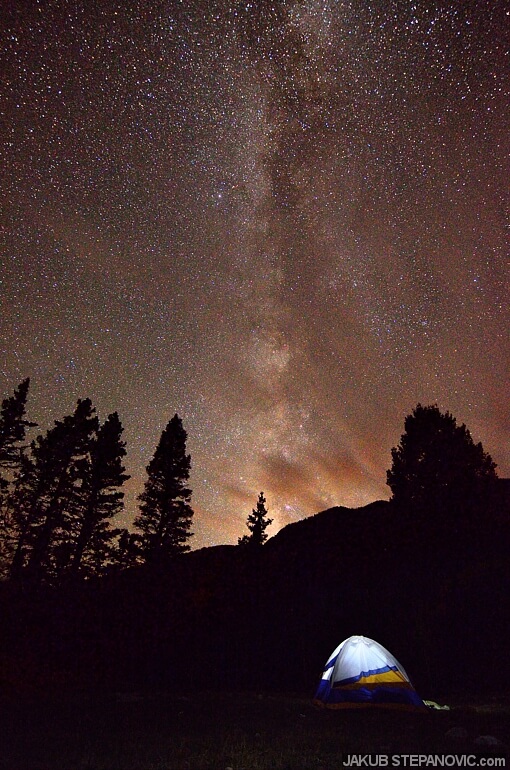
Meanwhile in New Mexico..
For example, with a tent, you can sleep in remote places while still having shelter. However, it cannot be set everywhere, and one has to carry an extra bulk and then spend some time building it. These restrictions can be avoided if you travel by car: simply use it as a tent on the wheels. It is safe, and if you don't drive a sporty convertible, it is comfortable too.
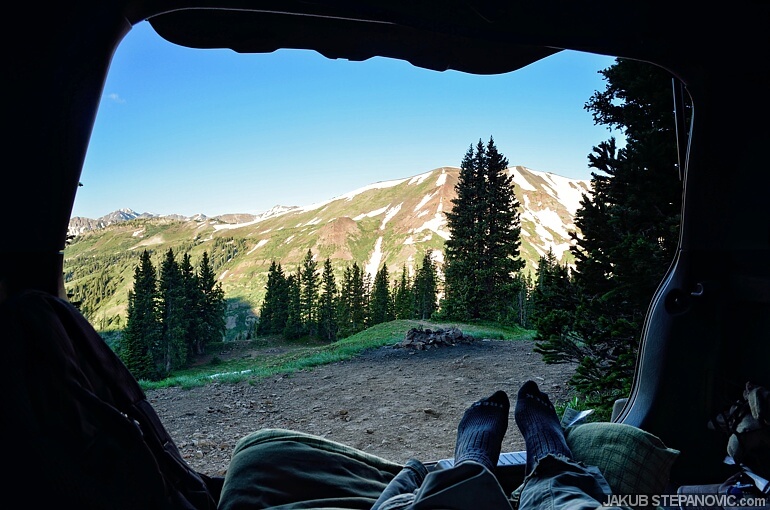
Here I am, enjoying a morning from a trunk of a car somewhere 11000ft / 3300m high in Colorado. The whole trip (9days) cost me less than $400. (See the story here) Experiences do not have to equal expenses.
If you are interested in car camping, I wrote some tips in the postscript below; scroll down, or let's look at other options:
If you want to go as lightweight as possible, with permitting weather conditions and a bit of courage, you can sleep just about anywhere — without any extra and pricy equipment. This; however, needs to be done right: you want to stay safe and warm. But when you do, it is a great experience that costs nothing and allows a massive sense of freedom.
Once you gain confidence, the possibilities are endless.

Sleeping under a smokestack of some abandoned factory.
Again, for more about sleeping rough, see the PS under the article.
Now I can hear some saying, "But I'd need to charge my gadgets!" Well, there are solutions for that too. We live in an age of brilliant technological achievements: A good, reliable power bank costs less than one night in an average-priced hotel in most cities and will last with you for long. If you are heading to a sunny location, you can get a small solar panel.
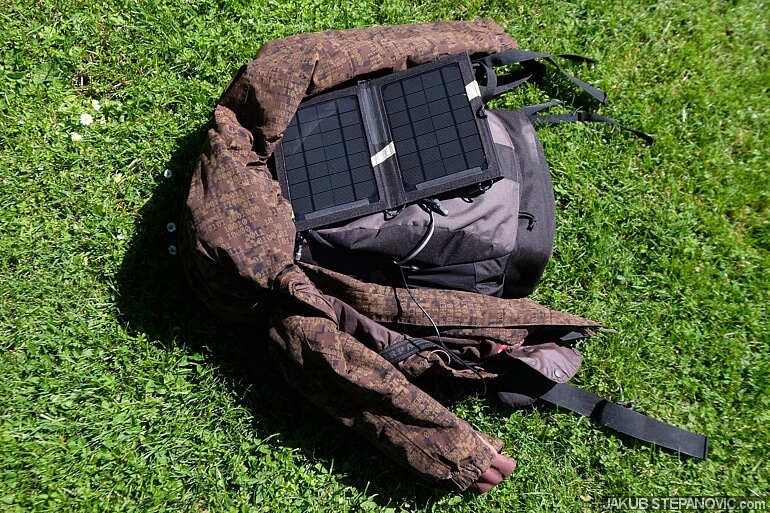
That's my backpack I had in Italy in 2016. I strapped a solar panel to the back, and it charged my camera and a phone while walking through historic streets. A similar setup proved itself in 2018 in Portugal, and in China, 2019.
If you are going to eat out, you can ask the restaurant's staff to plug your phone while dining there; they are usually happy to help. Many trains and buses have a plug these days, so make some use of it. And if you are in a city, look around; you might find some unattended sockets to use. I remember once in Kansas City, I located one outside of a closed bar. It worked well, and after 15m my camera was back in use.
Having solved the issue of recharging yourself and your devices, let’s move to another big budgeting item: transportation.
Similar to housing, getting outside the comfort zone is a win-win. You save money and get cool stories. Don't be afraid of public transportation; renting a car can be convenient, but it's likely to be pricier, and you won't get to interact with locals. I made loads of amazing memories on trains or buses while getting around China on a budget — something I'd miss if using a car. It improves your communication skills, too.
The best way to travel depends very much on the location you are visiting: You should always check out the local possibilities, as different parts of the world work on different principles — what cost a fortune in one place can be cheap elsewhere. For example, trains are the way to go in some European countries — whereas in others, a train can be twice as expensive as getting a plane. In the United States, you pay nearly three times less per gallon of gas than in the UK. Commonly, buses are the cheapest, but slow and not so comfy. So it is all about doing your homework and learning the option that would suit your needs. Either way, try to book in advance for the best deals.

Crowd surfing in the London Underground one late night. You don't experience that when driving a car. (See my posts from London here)
If you travel long distances across Europe, multiple budget airlines allow you to cross the continent for dirt cheap. These budget flights can be a pain, but they can also be the most convenient way to get somewhere. I wrote an article about how to enjoy traveling here.
Another cheap way to get somewhere is to carpool. Even if you are traveling alone and don't have a vehicle, you can always search the Internet and set something up via online groups. There is a good chance you'll find another person who will have the same direction as you and have a spare seat. You chip in some gas money, and it is a win-win for everyone. In Poland, for instance, this is the best price/performance way to reach places. You can also try to hitchhike, which will take out the time you spent looking for someone online, and it is free. However, this is another activity that requires some courage, and it can be tricky. But, after successfully hitchhiking in Europe, the USA, and even China, I can totally recommend it. Once again, see the end of the article for more info.
And last but not least, do yourself a favor, and get used to walking. It saves you pennies, and you will see the places more in-depth than when you'll take any faster means of transportation. Oh, and it's healthy, too.
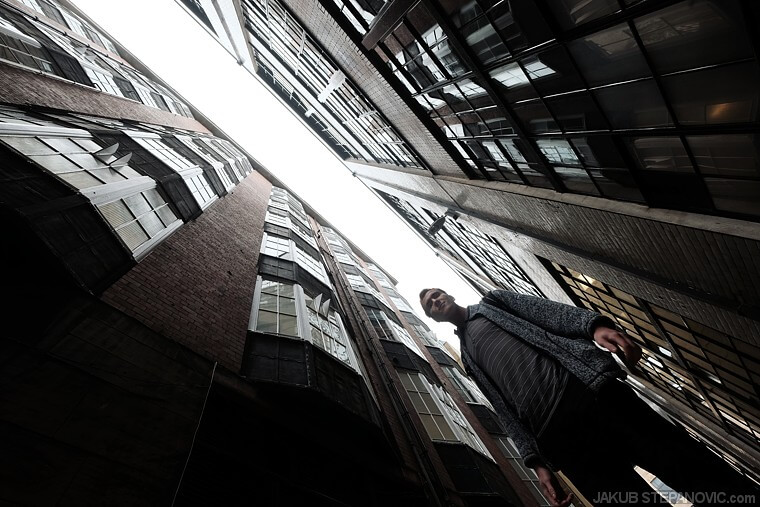
Walking in Glasgow.
Now, speaking of transportation – if you want to visit the other side of the planet, it can be expensive. But the thing is, I know many people who cry every day about the price Europe-Australia, yet they haven’t explored the country they are living in. It is happening way too often.
Every country has something exciting. You might be surprised what's behind your porch — you really don’t have to sit 10 hours on a plane to see beautiful things. A good practice is to try to appreciate and identify with as many things as possible. Different architecture, natural formations, cultural values, weather, crafts, everything. This will make traveling (and everyday life) more exciting, regardless of destination.
Speaking of finding exciting stuff, if we arrived at the wanted destination and solved where to sleep, let's talk attractions!
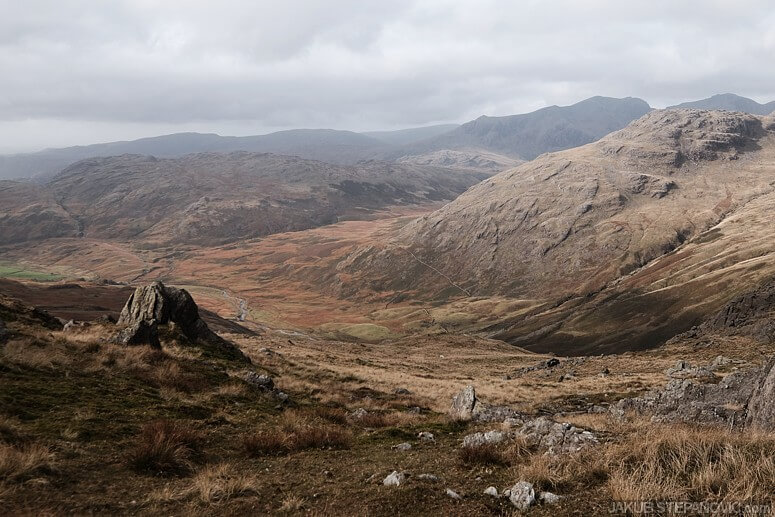
Mountains in the Lake District, UK. (Link for the story)
Nature is great, and what's also great is that it is usually for free or for a not-so-big contribution to a national park service. Yey! The situation changes if you're eager to see major cities, so I'll focus more on them and the options you have there.
Local guides will often push you to visit paid stuff. They'll say that the local aquarium, humongous amusement park behind the city, 4D cinema, and similar what-not is something not to be missed. Sometimes, they are right — but in most cases, they just want to sell it to you. Think if can you get the experience elsewhere, is it really worth it?
One of the things that I think deserve spending some cash on are places with a good view.
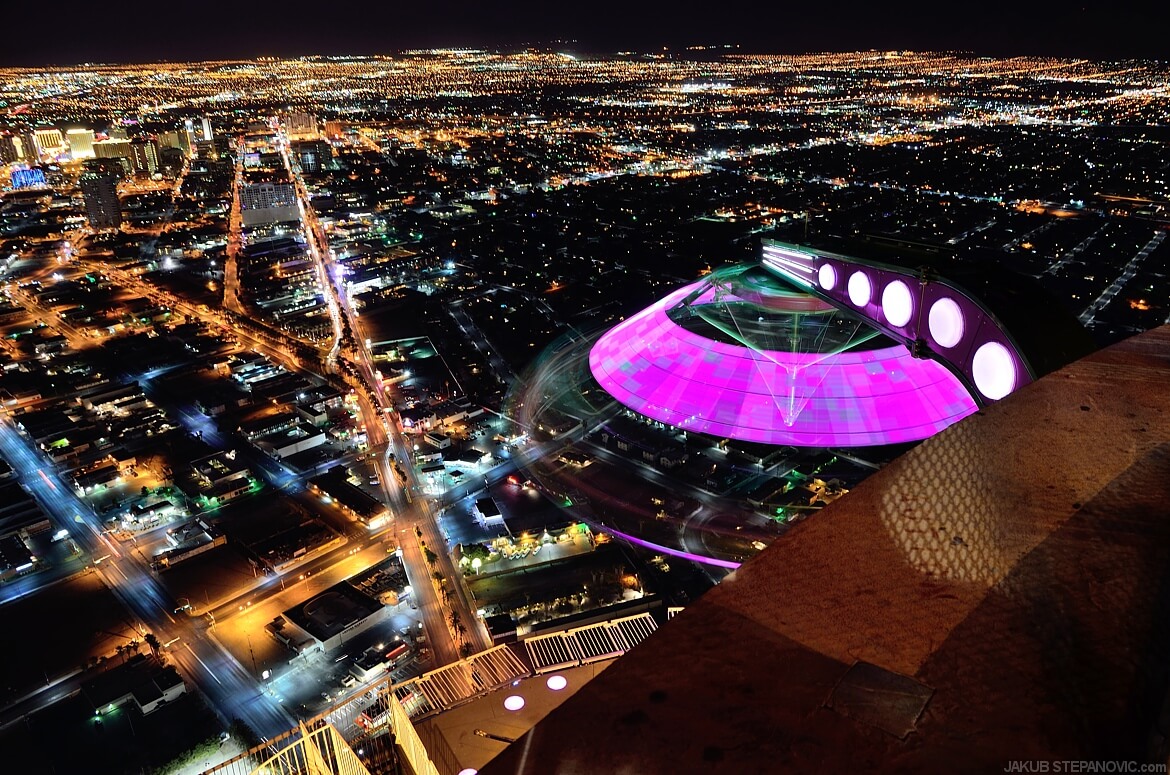
Vegas, baby!
Entering some famous observation decks can be costly; but again, if you shop around, you can score a sweet deal. The view from London's Shard, for example, costs over $40 if purchased at the door on the day of your visit, but if you book ahead, it can be under $15!
Pro tip: many skyscrapers have a fancy restaurant on its top — the food there will be expensive, but since you won't pay an entrance fee, you can look at the price of the meal as a ticket to the view + food as a bonus. For example, the pic below:

Stellar view of Shanghai's downtown from the WFC. You can either go to the observation deck, which costs around 16USD. Or, you can dress up and act fancy, and visit a restaurant located only a few meters under the observation platform, where you get the view and food for roughly the same price while having more personal space and comfort. Win!
Like with everything, luck is for the prepared; there are many free alternatives to get a great view, often offering some adventure as a bonus. I had a blast getting on tall structures all over the USA, Europe, and China and the vast majority were with no expenses. It is about not being afraid to talk with the concierge. When there's no porter to ask, try exploring other options — within some moral standards, of course.
It’s about thinking beyond regular office or residential towers. Multi-story parking lots can have a sweet view..
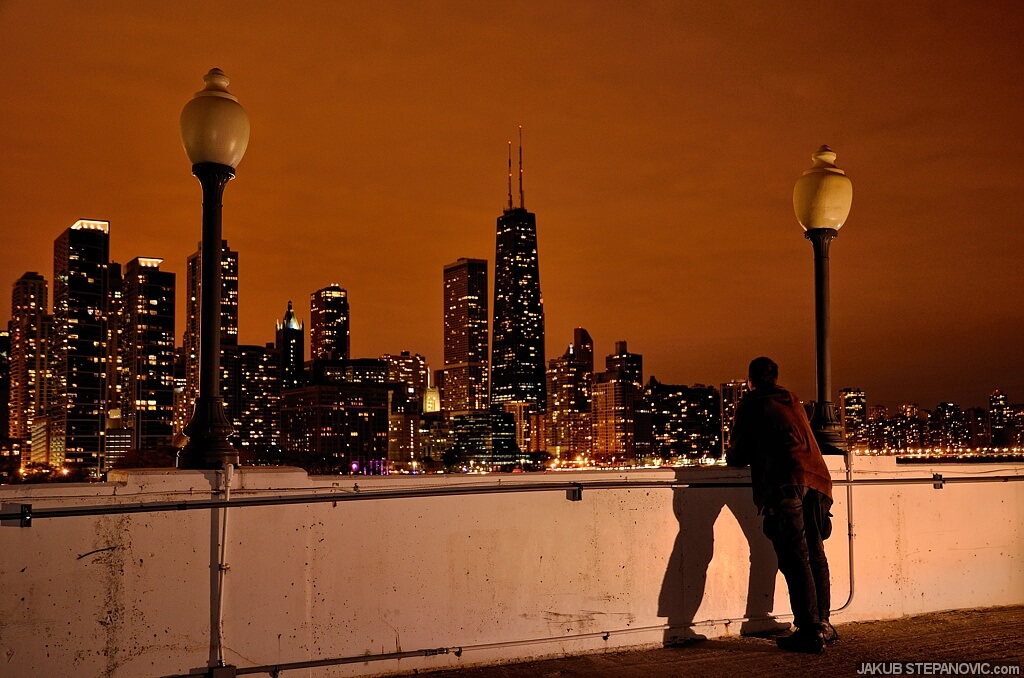
Meanwhile in Chicago.. On the top of a garage. No one around, just you and the city.
It’s about not limiting yourself to buildings, the ground level has it too. Hills are the first option to take..

Budapest from the Gellért Hill. (Read the story about that here)
You should plan ahead and browse a map to spot-search what's possible. Water is a good place to look at, as it is flat and nothing's in the way.

Selfie in New Orleans
When planning a trip to Dallas, I marked down a bridge from where a long straight section of a highway towards the downtown is, hoping to get a good view. It paid off, so the next time I went somewhere, I always looked at interstate intersections. It works. Here's Denver, for example.
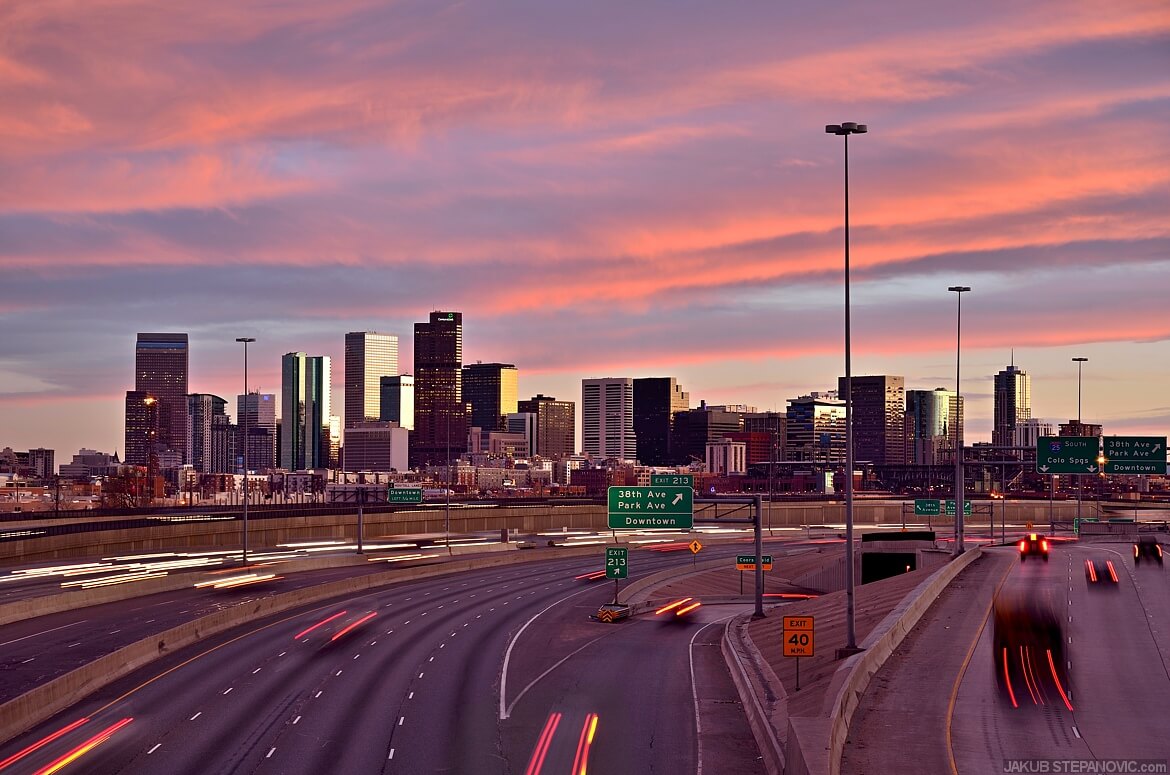
Another amazing and free thing to look at is interesting buildings. Architecture is unique to each city and should be on your list too.
And again, don't just stay with the classical touristy stuff. Explore!
Planning is a great thing to do, but you should also consider getting purposely lost for a few hours. Leave the map in your pocket, let the streets dictate where you go: A good-looking corner? Right, let's go there. That way you can discover some stuff no tourist guide would tell you about.
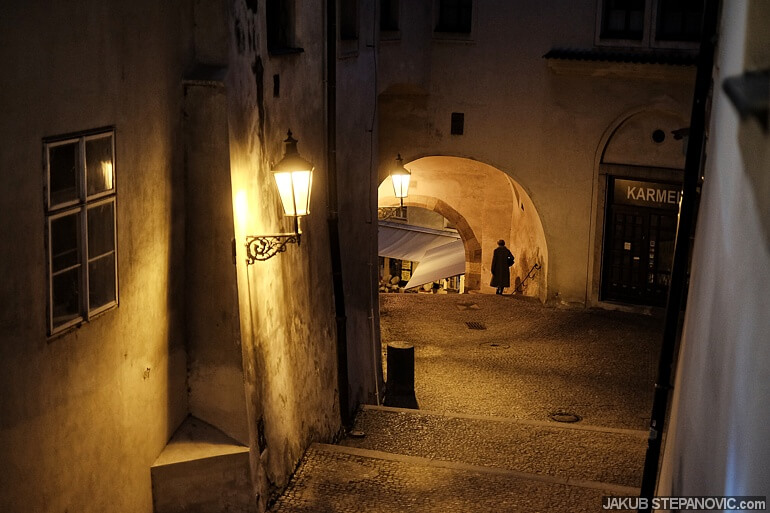
Atmospheric streets of Prague
Finally, a great and free thing to do is to start chatting with some locals. You will learn about their culture, habits, beliefs and such.

Recently in Germany
I can't express enough how can interactions with locals improve your experience. I already mentioned that people can open some doors with view for you, and you get a cool memory as a bonus: Once I got to talk with a receptionist of a residential tower about their flats and studios, and in a minute, we were on the rooftop, where we spent another hour chatting about the city. Another time, a security guy at one office building took me sideways and said, "no problemo, here's the access key. But let me walk away first so that I won't be seen with you on the cctv. Enjoy." And so on. But people can also recommend the best place to eat and point you towards some attractions you won't find elsewhere. A good place to start is local markets, fairs, pubs.. Just make the most of the place you are currently in.

Rodeo in the US Midwest
So there you have it. Sure, there are some reasons that halt your travel plans, but let’s face it; the fact that you aren’t a millionaire is not one of them.
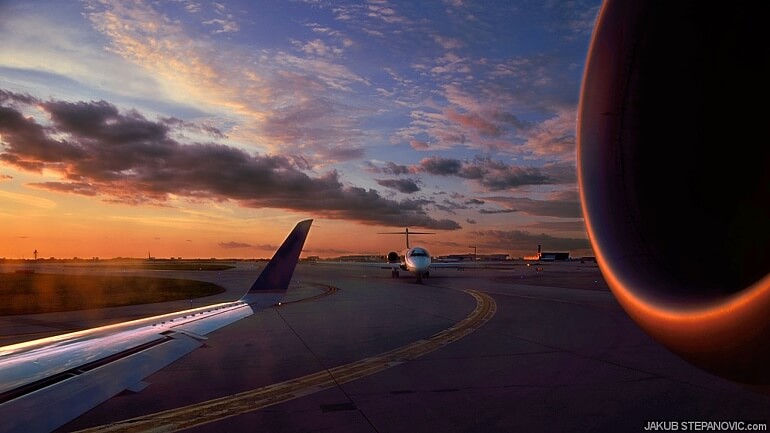
Traveling cheap can be challenging at times, but you will learn new things, improve your skills, meet new friends, be healthier and yes, get to see a lot.
If you don’t have a fat bank account but have the will to get out and explore, there’s nothing to stop you. No need to be weeping at disaster when there is none. Go and travel!
Here are the mentioned add-ons..
PS0 Planning the trip
- ..is essential. Sure, improvisation is a good thing, but if you have no plan at all, you have nothing to improvise on.
Set some goals, use your time efficiently, and see more for cheaper. - Prepare depending on the location — you won’t take the same clothes into some metropolis as into a remote mountain range. But generally, less is more. Less weight to carry and fewer pieces to worry about equal more opportunities to see unique places.

Zion, Utah
- Learn how to read and use maps. Familiarize yourself with contour lines and scales, know where's the north, etc. It'll help you plan for efficient routes, good perspectives, and you won't get lost unless you want to.
I do all my planning electronically and then download it into my cell phone — it's a small box where you can have all the maps and dictionaries you need, without the extra bulk. Think about the location you are going — in big cities, you can find WiFi on every corner, but in some remote mountains you can't even get a text message. Plan accordingly.
As for the camera gear, I used to walk with several lenses, tripods, and such; nowadays, I usually have only one, max two lenses depending on scenes I anticipate capturing. Whatever suits your style works. Don't forget to enjoy the moment tho, while trying to get the best shot on earth.
Don't overthink it. It's not rocket science. Just don't forget your keys, wallet with some cash in local currency, memory cards, and chargers.
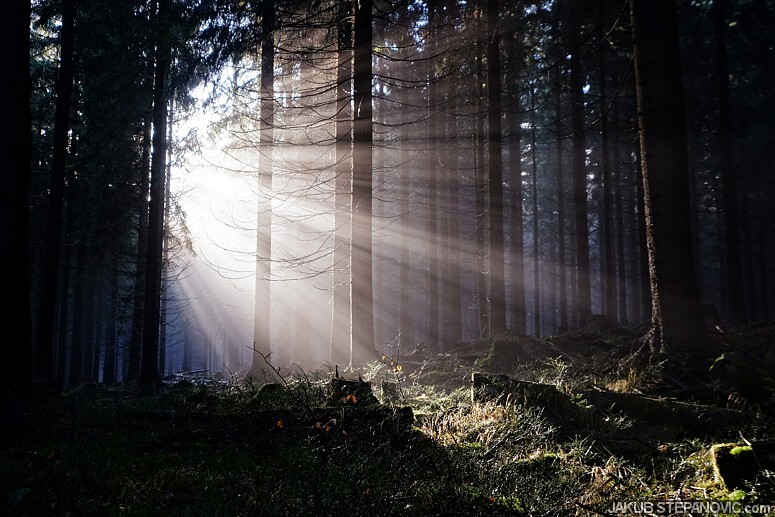
Forest in Jizerske hory
PS1: Things about sleeping in a car I wish someone has told me:
- A good vehicle for this purpose is the key. Sure, if you can sleep in an airplane's economy class, you can sleep anywhere. But cars with folding-flat rear seats, small SUVs, station wagons, and hatchbacks are tremendously more practical and comfortable than sedans, coupes, mentioned convertibles, or even pickup trucks.
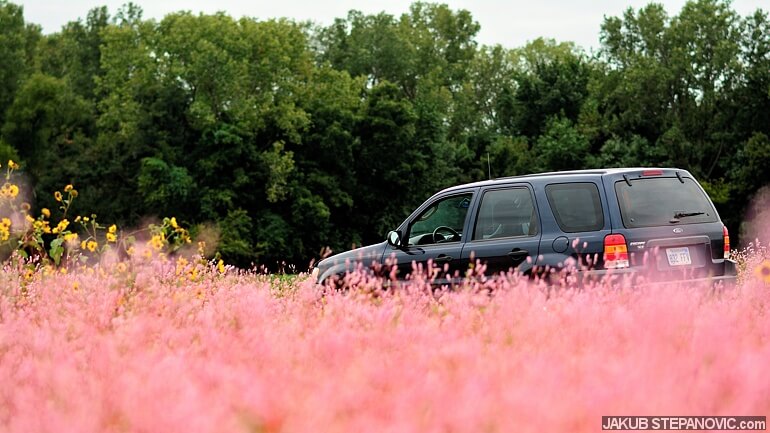
I slept in this thing over 100 times. Oh, memories. What a car this was.
- You want to blend in as much as you can, for both safety and legal reasons. For that, it’s best to drive some average, stock, not a flashy vehicle. Get rid of those stickers and loud exhaust pipes; they won’t do any good to you. And keep your car reasonably clean, (unless you park in some fishy neighborhood and want to hide your foreign license plate under a layer of mud..).
- Tinted rear windows are very helpful. First, it's easier to fall asleep in a darker place and second, you ain't get noticed as easily. If you don’t have them and want to sleep in an urban area, get some dark blanket to hide under.
- Get a sleeping bag or a good blanket. It can get really cold even during summer months and freezing, or sleeping in five coats, is not pleasant. Been there, done that, not fun.
- Unless you really need an extra layer of insulation (either thermal or noise), open a window a bit to prevent fogging your windshield from your breath. Still, it's handy to pack something to wipe windows efficiently.
- For the money you save on accommodation, you can eat out daily. For even further savings (or trips to remote locations), figure out what tastes good to you and doesn't need a fridge — there are loads of meals that can be prepared like that. If you want to live off the grid for an extended time, it's possible to get a portable fridge and a gas stove, and you can cook anything, anywhere.
- As for hygiene, in urban areas are public bathrooms nearly everywhere. Someone might give you an odd look while brushing your teeth in a fast-food bathroom, but so what. Carry a truckload of water with you, not just for washing but for drinking as well. Showers in truck stops, swimming pools, beaches… If you are heading away from civilization, check out the map for possibilities. For example, mountain streams are often cleaner than the water in the public bathroom — and swimming in a waterfall instead of a shower is a fabulous way to end a day.

one of my first nights in a car, back in 2012
PS2: Things about sleeping open air..
- Just as with car tenting, the safest is when nobody around knows that you are sleeping there. It is commonly easier to find these places somewhere out in the woods than in a city. But if you look around, you can find a good spot almost everywhere. I had better sleep on the top of the scaffolding of one construction site than on a bench next to a path in a national park.
- Get a sleeping bag, period. Nowadays you can get nice lightweight ones, so it's not even such a pain to carry it with you. Some sleeping pad is useful too — it depends on your preferences. Usually, if I am out just for a night or two, I'd have only a thin thermal insulation foil, because it weighs nothing and doesn't take any space — but you won't get much comfort that way. When going out for longer I like those self-inflating sleeping pads.
- The fewer possessions you'll have, the less worried you'll be. You can store your wallet in a pocket inside the sleeping bag, and use your backpack as a pillow.
- Take a battery out of your camera and store it in the pocket inside the sleeping bag too, it will keep more power than outside in the cold.
- You'll feel safer in a group of friends. It will be more fun, too.

Palo Duro, Texas. one of the very few nights out I when didn't use a sleeping bag and was comfortable.
PS3: Sleeping in a bus/plane/train
Try to chat. You can be lucky and meet a great traveling buddy to share some great stories over the whole journey. But when that's not the case, or you just want to get some rest...
- ear-plugs (or better: noise-canceling headphones) are more important to me than a pillow. Sometimes you run into a coach filled with shouting/snoring individuals and to sit next to them for a few hours can be a pure misery right there.
- If I've a backpack, usually I hold it the whole time. It's much harder to pry your possession from your hands than from overhead storage.
PS4: Hitchhiking.
- Getting a good spot is the key! Think of it from the driver's perspective: nobody is going to stop you in a middle of a curve, or on a freeway where an average speed is 80 mph. It would be dangerous and inconvenient. Try to be at the ramps, or just outside of the city limit in a clear, visible spot with some space for cars to pull over. Gas stations can be good too.
- Clean, neutral clothes are the way to go. Nobody's going to get some dirty, greasy person on their seats, nor stop to someone with big offensive images or signs on their shirt. Don't wear too revealing clothes — stay safe.
- I did most of hitchhiking alone, but I am a 6'6" guy. Traveling in a couple is generally safer. If there are more of you, split into couples, simply because people usually don't drive around with an empty 12-seater.


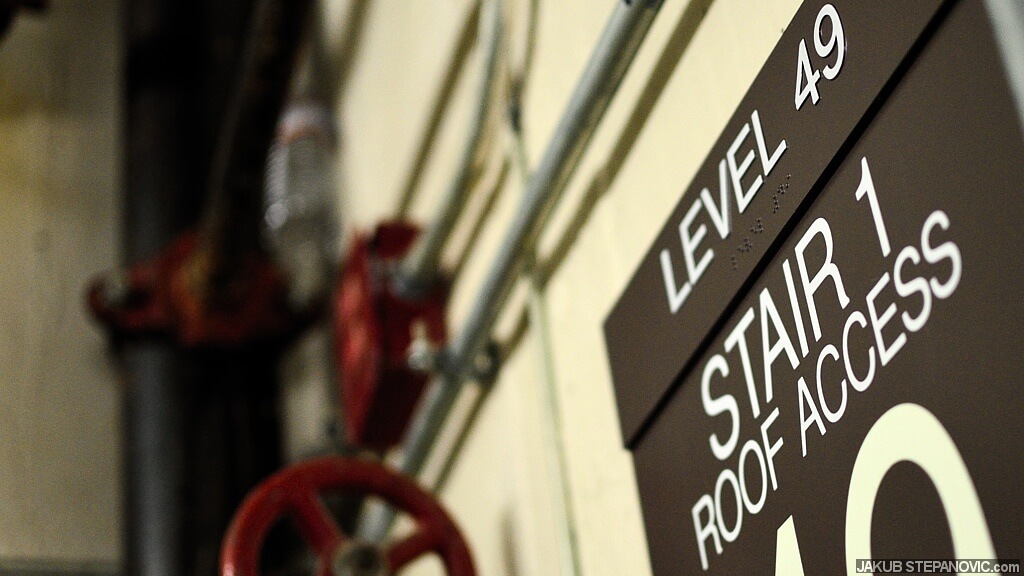
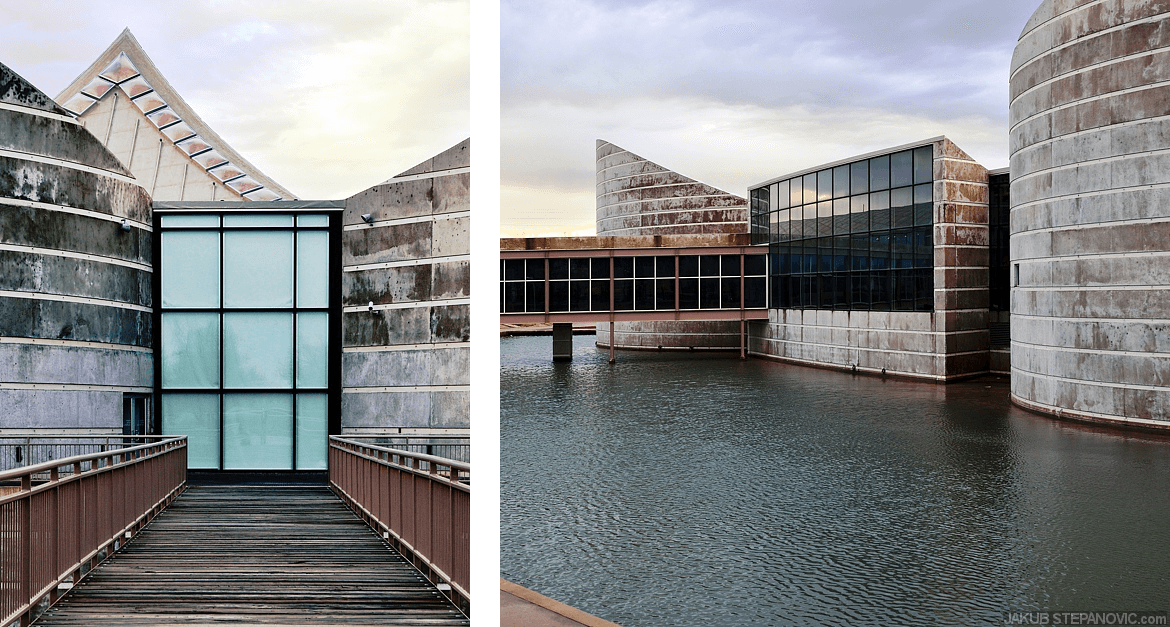
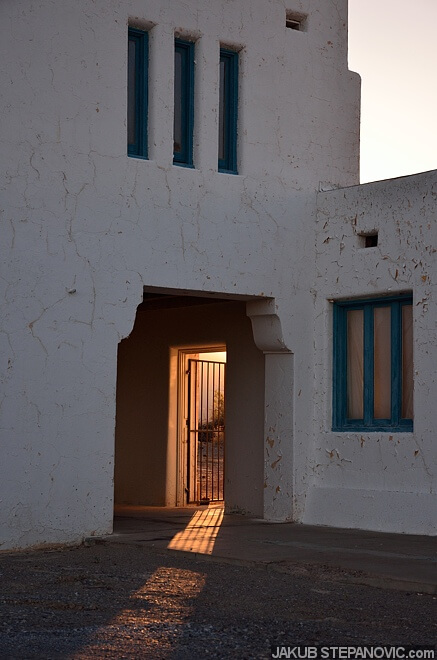

Comments